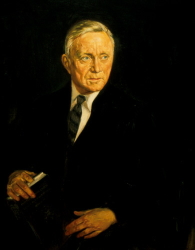|

|
|
Douglas was a self-professed outdoorsman, so much so that according to The Thru-Hiker's Companion, a guide published by the Appalachian Trail Club, Douglas hiked the entire 2,000-mile trail from Georgia to Maine. His love for the environment carried through to his judicial reasoning. In the landmark environmental law case, Sierra Club v. Morton, 405 U.S. 727 (1972), Justice Douglas famously, and most colorfully argued that "inanimate objects" should have standing to sue in court: The critical question of "standing" would be simplified and also put neatly in focus if we fashioned a federal rule that allowed environmental issues to be litigated before federal agencies or federal courts in the name of the inanimate object about to be despoiled, defaced, or invaded by roads and bulldozers and where injury is the subject of public outrage. Contemporary public concern for protecting nature's ecological equilibrium should lead to the conferral of standing upon environmental objects to sue for their own preservation. This suit would therefore be more properly labeled as Mineral King v. Morton.He continued: "Inanimate objects are sometimes parties in litigation. A ship has a legal personality, a fiction found useful for maritime purposes. The corporation sole - a creature of ecclesiastical law - is an acceptable adversary and large fortunes ride on its cases.... So it should be as respects valleys, alpine meadows, rivers, lakes, estuaries, beaches, ridges, groves of trees, swampland, or even air that feels the destructive pressures of modern technology and modern life. The river, for example, is the living symbol of all the life it sustains or nourishes - fish, aquatic insects, water ouzels, otter, fisher, deer, elk, bear, and all other animals, including man, who are dependent on it or who enjoy it for its sight, its sound, or its life. The river as plaintiff speaks for the ecological unit of life that is part of it."In the early 1970s, Mr Douglas and his young wife Cathleen were invited by the late Dr Neil Compton and the Ozark Society to visit and canoe down part of the free-flowing Buffalo River in Arkansas, putting in at the low water bridge at Boxley. This experience endeared him to the river and the young organization's idea of protecting it. As such Mr Douglas was instrumental in having it preserved as a free-flowing river, left in its natural state. This decision was much to the chagrin of the area's Corps of Army Engineers, who were busily damming every river they could. 'Flood control' was usually their rallying cry. The act that soon followed designated the Buffalo river as America's first National River. He is credited with saving the Chesapeake and Ohio Canal and inspiring the effort to establish the area as a national park; going as far as to challenge the editorial board of The Washington Post to go with him for a walk on the canal after it had published opinions supporting Congress' plan to pave the canal into a road. His efforts convinced the editorial board to change its stance and helped save the park. In 1962, Douglas wrote a glowing review of Rachel Carson's book Silent Spring which was included in the widely-read Book-of-the-Month Club edition. He later would sway the Court in the direction of preserving the Red River Gorge in eastern Kentucky: a proposal to build a dam and flood the gorge reached the Supreme Court. Douglas visited the area himself (Saturday, November 18th, 1967). The Red River Gorge's Douglas Trail is named in his honor. The Sierra Club's William O. Douglas Award, esdtablished in 1976, Recognizes those who have made outstanding use of the legal/judicial process to achieve environmental goals, particularly those with national significance.
In 2005 Robert F. Kennedy Jr. accepted the William O. Douglas award on behalf of
The Riverkeepers. In his acceptance speech he talked about he, as an 8 year old boy, and his family doing a two week camping trip with Douglas. Kennedy's grandfather
brought Justice Douglas into public life and gave him his first job at the SEC as his deputy and then got Franklin Roosevelt to appoint him to run the SEC and played a critical role in getting him appointed as a justice of the Supreme Court.
Books:
Links: Return to People
| |